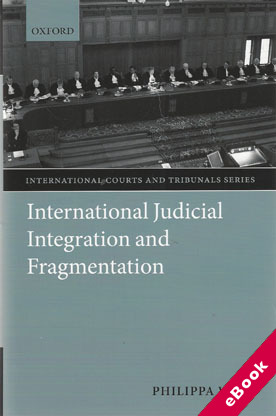International Judicial Integration and Fragmentation (eBook)
ISBN13: 9780191650840
Published: May 2013
Publisher: Oxford University Press
Country of Publication: UK
Format: eBook
(ePub)
Price: £30.41
The amount of VAT charged may change depending on your location of use.
The sale of some eBooks are restricted to certain countries. To alert you to such restrictions, please select the country of the billing address of your credit or debit card you wish to use for payment.
Sale prohibited in
Korea, [North] Democratic Peoples Republic Of
Due to publisher restrictions, international orders for ebooks may need to be confirmed by our staff during shop opening hours. Our trading hours are Monday to Friday, 8.30am to 5.00pm, London, UK time.
The device(s) you use to access the eBook content must be authorized with an Adobe ID before you download the product otherwise it will fail to register correctly.
For further information see https://www.wildy.com/ebook-formats
Once the order is confirmed an automated e-mail will be sent to you to allow you to download the eBook.
All eBooks are supplied firm sale and cannot be returned. If you believe there is a fault with your eBook
then contact us on
ebooks@wildy.com and we will help in resolving the issue. This does
not affect your statutory rights.
Need help with
ebook formats?
Fragmentation is one of the major debates within international law, but no detailed case studies have been made to show the problems that it creates, and how they can be addressed.
This book asks whether the growing number of international judicial bodies render decisions that are largely consistent with one another, which factors influence this (in)consistency, and what this tells us about the development of international law by international courts and tribunals. It answers these questions by focusing on three areas of law, genocide, immunities, and the use of force, as in each of these areas different international judicial entities have dealt with cases stemming from the same situation and set of facts.
The work focuses on four main courts:-
- the International Court of Justice (ICJ),
- the International Criminal Court (ICC),
- the International Criminal Tribunal for the Former Yugoslavia (ICTY),
- and the International Criminal Tribunal for Rwanda (ICTR),
which often interpret, apply, and develop the same legal principles, despite their different mandates and functions. It argues that judicial fragmentation is damaging to the international legal system, as coherent and compatible pronouncements on the law by international courts are vital to retaining the confidence of the international community. Ultimately, the book makes a plea for the importance of judicial integration for the stability and reliability of the international legal system.
